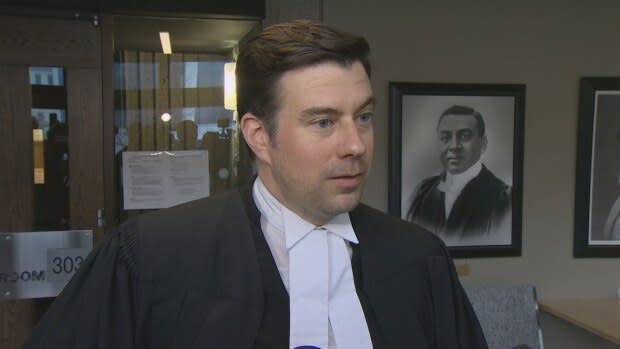Issue of consent central in closing arguments at Matthew Percy trial
Lawyers in the Matthew Percy trial made final arguments Thursday in Halifax, arguing about who should be considered credible in a case where the accused claims he obtained verbal consent and the complainant alleges she was raped.
Percy, a 36-year-old former Saint Mary's University groundskeeper, has pleaded not guilty to sexual assault causing bodily harm and is being tried by judge alone in Nova Scotia Supreme Court in Halifax. The alleged incident happened in December 2014 at a Dalhousie University residence.
Over the past week and a half, the court heard testimony from the complainant, two of her roommates, police officers and a sexual assault nurse examiner who met with the woman in hospital.
The crux of the case rests on whether there was sexual activity that the then-19-year-old woman did not consent to.
The woman, whose identity is protected by a publication ban, told the court her memory of the night she met Percy is patchy as she'd been drinking and so much time has passed. But she was adamant that he sexually assaulted her and that the attack left her with bruises and bite marks. She went to police two days later.

Percy did not testify in his own defence as he did in two previous sexual assault trials. However, the Crown introduced an interview he did with police in 2014. In it, Percy told a Halifax Regional Police investigator that the sexual encounter was "rough" but consensual, and that the complainant kept saying, "Take me."
He also told police the woman initially told him no when he suggested anal sex, but agreed after he pleaded with her. The defence's position is that Percy took reasonable steps to ask about consent and received an "OK" before proceeding.
"If you believe the evidence in the videotaped police statement, you must find him not guilty. If you don't believe it, but you have doubt, you still must acquit Mr. Percy," defence lawyer Peter Planetta said to Justice Josh Arnold.

Planetta said Percy's statement to police didn't always cast his client in a favourable light — he admitted he liked having physical control over a woman — but the defence lawyer suggested that spoke to how open Percy was being and the statement was "worthy of belief."
"He was taken through the story three times by the police officer, he told the story pretty much the same way each time, it was consistent and consistency makes credibility," Planetta said outside the courtroom.
Since his evidence came in the form of the police statement only, Percy wasn't cross-examined about his answers.
But prosecutor Rick Woodburn asked the judge to reject Percy's claim, saying the idea of him saying "please" and waiting for a yes didn't line up with evidence from the complainant or even what Percy himself told police about the encounter.
"All the control, all the dominance, all the pressure, is there any way one could even believe that Mr. Percy would ask that she was OK with [anal sex]?" he said. "The Crown's submission is that he just took, like he took everything else."

Woodburn recounted word-for-word much of the complainant's description of the night, from being charmed when Percy offered her his sweater outside Cheers to being confused at the residence when he ordered her to her knees when she expected to be eating the poutine they'd picked up.
Planetta argued the complainant's memory was inconsistent and suggested she at times had "convenient memory loss" — pointing out, for example, that she didn't remember what she drank all night except that she knew she had a cider with Percy at the Toothy Moose.
In response, Woodburn said though the 24-year-old didn't remember "minor things" like the walk to Willy's for poutine, her focus was "laser sharp" during the alleged sexual assault. He argued the complainant's memory was naturally more focused on the moments when she was experiencing violence and that her descriptions of it were "unwavering."
"She was an extraordinarily reliable witness when it came to what exactly she knew happened to her," he said.

During his closing, Planetta also challenged that the Crown proved Percy caused the woman's injuries, and he said they didn't meet the bar for bodily harm.
"She couldn't rule out that she fell. She couldn't remember," he said. "So she cannot rule out the injury being caused in another way."
But Woodburn said it was "very obvious" Percy caused the woman's injuries when taking into account her roommate's testimony about hearing the sound of slapping and the sexual assault nurse examiner's evidence about finding bite marks and finger-shaped bruises on her body.
The Crown's closing arguments will continue Friday morning.
Four woman have accused Percy of sexual assault. In 2018, Percy was convicted of sexually assaulting a Saint Mary's student and recording part of the encounter on his phone. In another trial involving a different woman, he was acquitted of sexual assault and voyeurism.
The fourth case is scheduled to go to trial later this year.
The CBC's Elizabeth McMillan live blogged from court. Some of the content of the live blog may be disturbing.
MORE TOP STORIES


